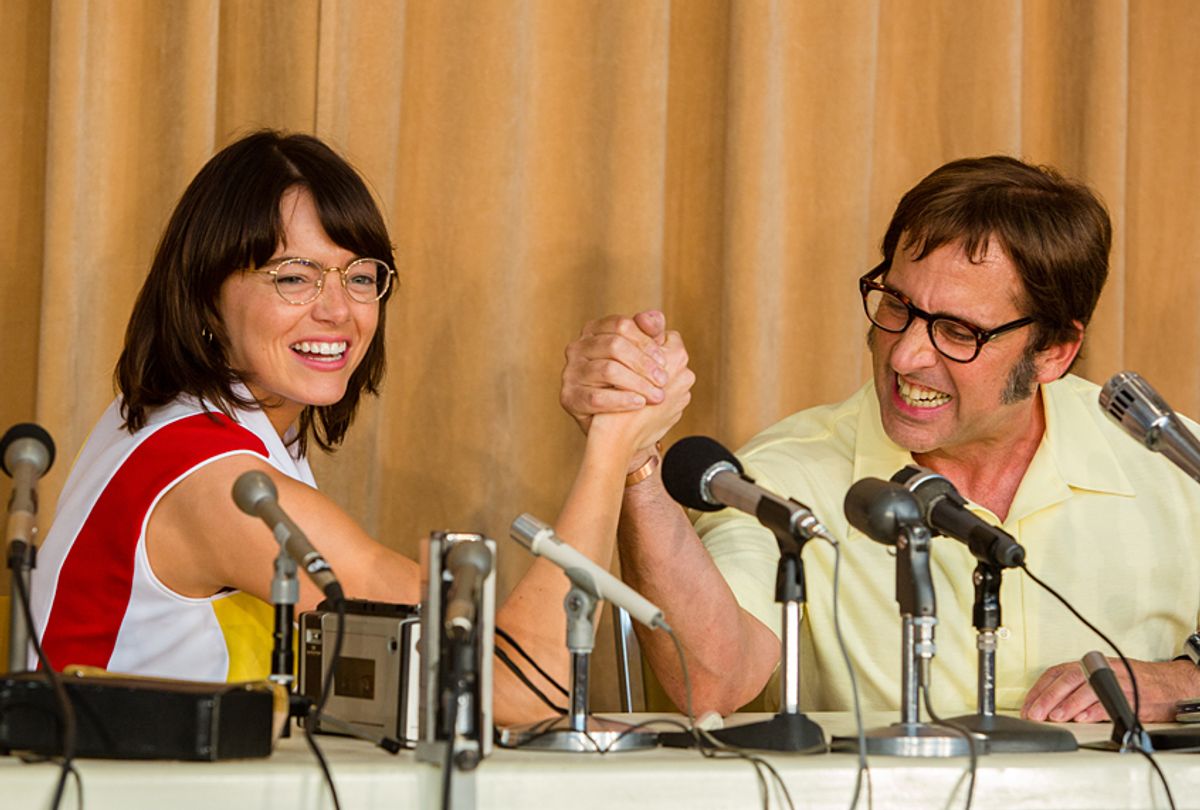There are a few different ways you could tell the story of the 1973 “Battle of the Sexes” tennis match between Bobby Riggs and Billie Jean King. In the movie “Battle of the Sexes” (out Sept. 22), Jonathan Dayton and Valerie Faris (“Little Miss Sunshine”) opt for the most conventional. Simon Beaufoy’s (“Slumdog Millionaire,” “127 Hours”) screenplay doesn’t wade into the conspiracy theories that Bobby Riggs threw the match. Nor does it fictionalize the event the way, say, Todd Haynes fictionalized Bob Dylan’s life in “I’m Not There.” Instead, “Battle of the Sexes” is a three-act PG-13 sports movie that climaxes in a monumental moment of odds-defying, sports-transcending triumph. It’s the same playbook used in “Rocky,” “Remember the Titans,” “Rudy,” “Miracle” and a million other sports movies. But man is it resonant now!
If you’re vaguely aware of the story behind the match (watching the trailer will do) and if you were sentient throughout the 2016 presidential election, you get it. Bobby Riggs is an old, white clown who promotes the match by labeling himself a “male chauvinist pig.” He faces off against Billie Jean King, a serious woman equally driven on the court and in the pursuit of equality. The parallels could hardly be more glaring if the story included Russian subterfuge.
But “Battle of the Sexes” is too smart — or honest — to cast Riggs (Steve Carell) as a nefarious villain. The movie opens by showing him bored by life post-professional tennis. A gambler and showman at heart, Riggs is incapable of settling into an office job and the doldrums of middle-aged married life. After Billie Jean King wins a tournament, he hears on the radio that King has become the most successful female tennis player ever, and he gets an idea. He’ll challenge the top women. At the time, Riggs was married into wealth, so he didn’t need the money. Nor does it seem he was motivated by a desire to flaunt male superiority. He was just looking for some attention and a good romp.
Billie Jean King (Emma Stone) understands Riggs’ angle. And she doesn’t want any part of it. But when Riggs beats Margaret Court, the other top women’s player, King finds herself boxed into a corner. The movie introduces King by showing her fighting for equal pay in a tournament. When the tournament promoters refuse, citing a variety of reasons that barely veil the underlying sexism (from “men draw more fans” to “men are more exciting to watch”), she starts her own tournament. The match against Riggs is part of the same battle. If she refuses the challenge, she’ll be perceived as a coward; if she loses, it will validate the sexism. But if she wins the match, she could chip away at systemic male supremacy.
There’s an illuminating scene that comes just prior to the match, in which Billie Jean King tells Jack Kramer (Bill Pullman) why she won’t play if he is the game’s commentator. Kramer is the same promoter who refused King’s demands for equal pay. And during the Riggs-Court match, he picked Riggs to win because of his belief that women aren’t built to handle the pressure. The difference between Riggs and Kramer, King tells Kramer, is that Riggs is a clown and Kramer doesn’t respect women. One is a provocateur, the other is a propagator of harmful prejudice.
Perhaps it’s obvious, but the great insight on the part of King — and the film — is that she and Riggs primarily exist as symbols. “I think everyone cares what I do,” King tells a female love interest after she has listed off all off the reasons they can’t be together. The film juxtaposes King agonizing over the world’s perception of her with Riggs blatantly disregarding what other people want from him. They’re held to different standards. She has to be perfect. He doesn’t have to be anything (again, sound familiar?).
I’m not sure whether “Battle of the Sexes” is supposed to be a reminder of how far America has come in the past 45 years or proof that the nation has made hardly any progress at all. Maybe both. Equal pay for equal work is practically universal consensus. And Jack Kramer comes across as a dinosaur. But then, how far removed is James D’Amore? And what of Trump stalking Hillary Clinton on the debate stage? And on and on.
Billie Jean King clearly didn’t shatter American sexism with a few sharp swings of her racket. But the movie is a testament to the importance of clearing barriers. Jonathan Dayton and Valerie Faris didn’t need to make a Haynesian fictionalization; their film inspires viewers to imagine an alternative history of both the past and the present. The stakes of a presidential election are much greater than those of any tennis match, but there’s a universe where King loses and it empowers misogyny in the same way as Trump’s victory. And conversely, there’s a universe where Hillary Clinton wins the presidency and the victory moves national policies and norms forward, faster.
The history of American biopics is littered what Tom Brown, in “The Biopic in Contemporary Film Culture,” refers to as a “Great White Man-centric” view of history. The biopic has often been an engine of American myth-making, by and for white men. Without casting all white men as evil, “Battle of the Sexes” succeeds at myth-disassembling. Trump may be a chauvinist pig, but more pernicious than Trump is the system from which he benefitted. There are more artistically inspired versions of the “Battle of the Sexes” story, but in art, like in tennis, the moment dictates the shot; this moment called for a crisp forehand smash, and “Battle of the Sexes” delivered.

Shares